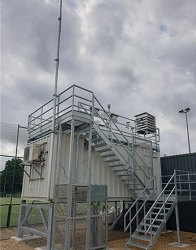NERC Air Quality Supersites

Image: A new urban air pollution reserach observatory (supersite) located in London.
Emissions of gases and particles to the atmosphere have profound effects across geographic scales, from the very local, on individuals, to the global climate system. Air pollutants include short-lived species that affect human health and damage ecosystems and longer-lived gases that impact on climate processes and stratospheric ozone. There are major outstanding scientific uncertainties associated with measuring i) the emissions, transformations and impacts of air pollution on public health, ii) the natural and man-made budgets of greenhouse gases and iii) the changing nature of ozone depleting chemicals. This is science that is globally significant but that has direct and urgent UK relevance.
Science gaps currently limit the effectiveness of efforts to reduce the national health costs of pollution and ecosystem damage, and they create major uncertainties in the delivery of cost-effective greenhouse gas reductions and industry actions to support the recovery of stratospheric ozone.
In part this funding supports a new integrated network of long-term atmospheric facilities for research permanently located in the UK. These new urban air pollution research observatories ("supersites") located in central Manchester, Birmingham and London. The investment builds on existing observatory infrastructure in the UK, adding state of the art research instrumentation to some strategically located Defra air pollution monitoring stations in UK cities.
These facilities support the UK in its efforts to improve air quality in cities by providing direct evidence of pollution composition, trends and where actions would be effective. Consequently, they enhance the UK capacity to meet European and national targets for human pollution exposure, for ozone ecosystem exposure, the National Emissions Ceiling Directive and trans-boundary Gothenburg protocol. They generate science that give the UK a leadership position for developing global policy on new emerging chemicals, but also provide science that can be used practically at the local scale by individual cities and Local Authorities.
PI: Dr Dave Green


